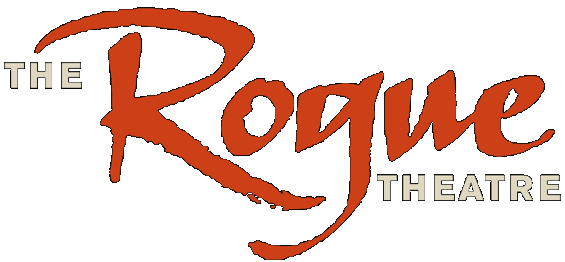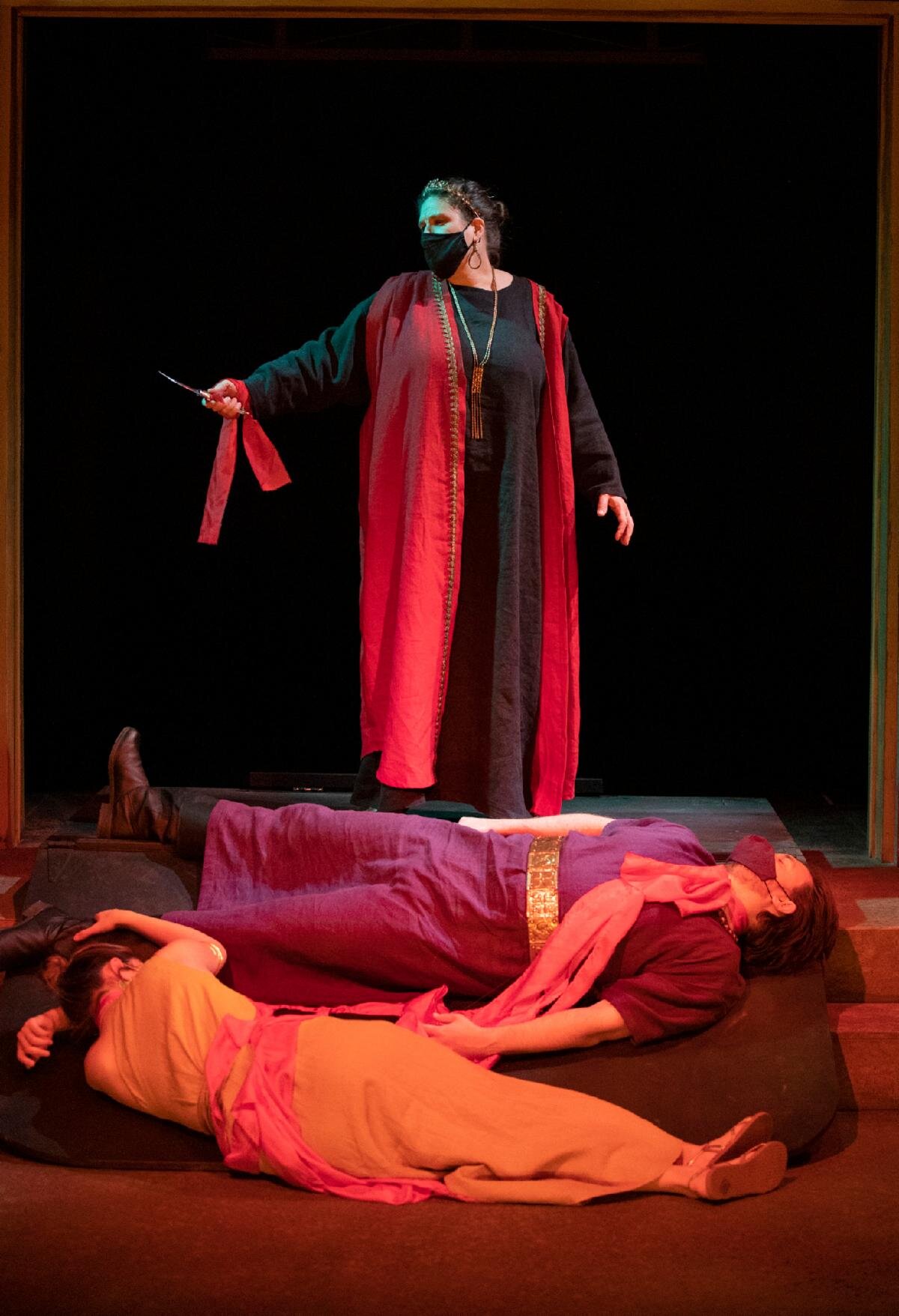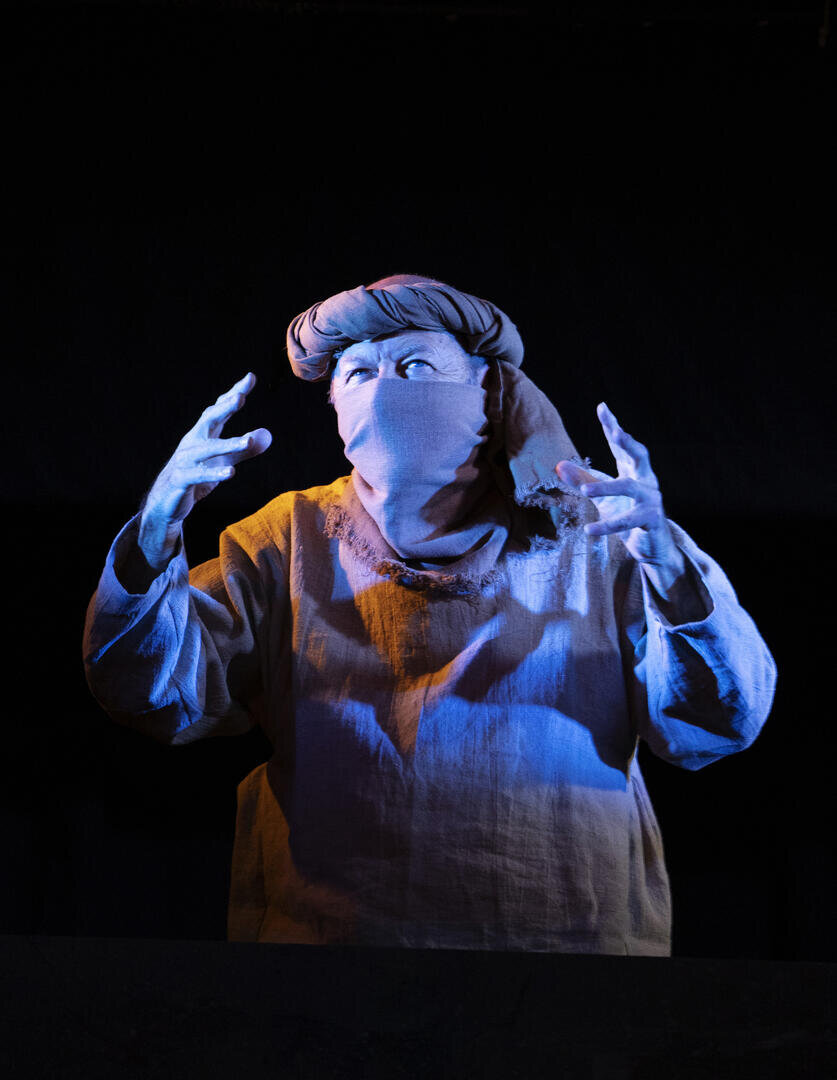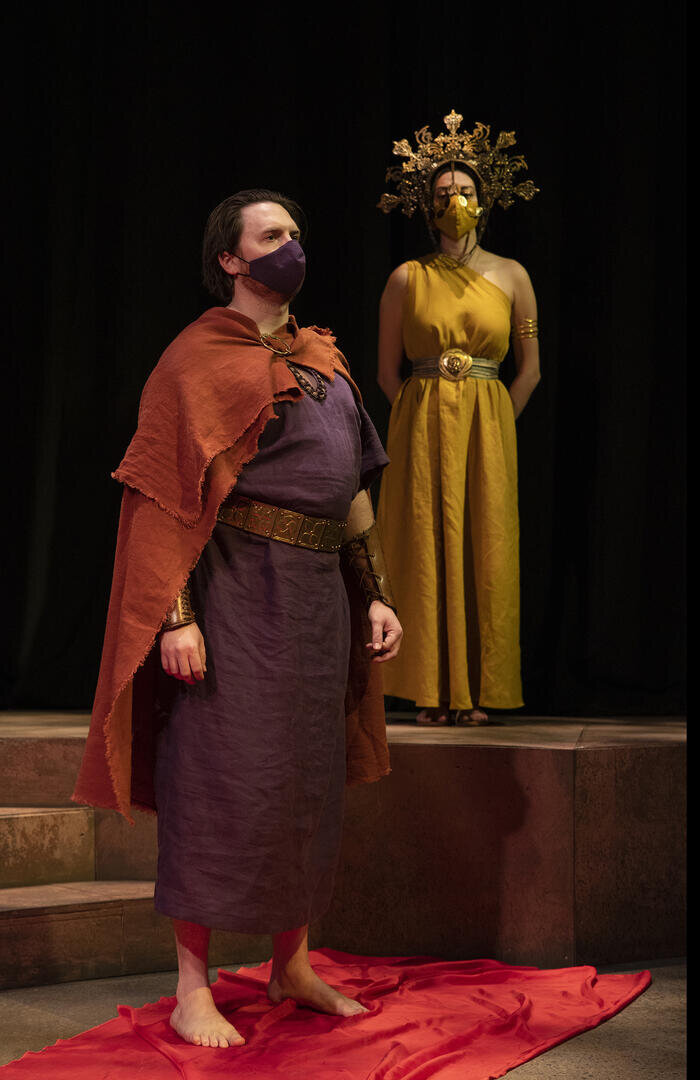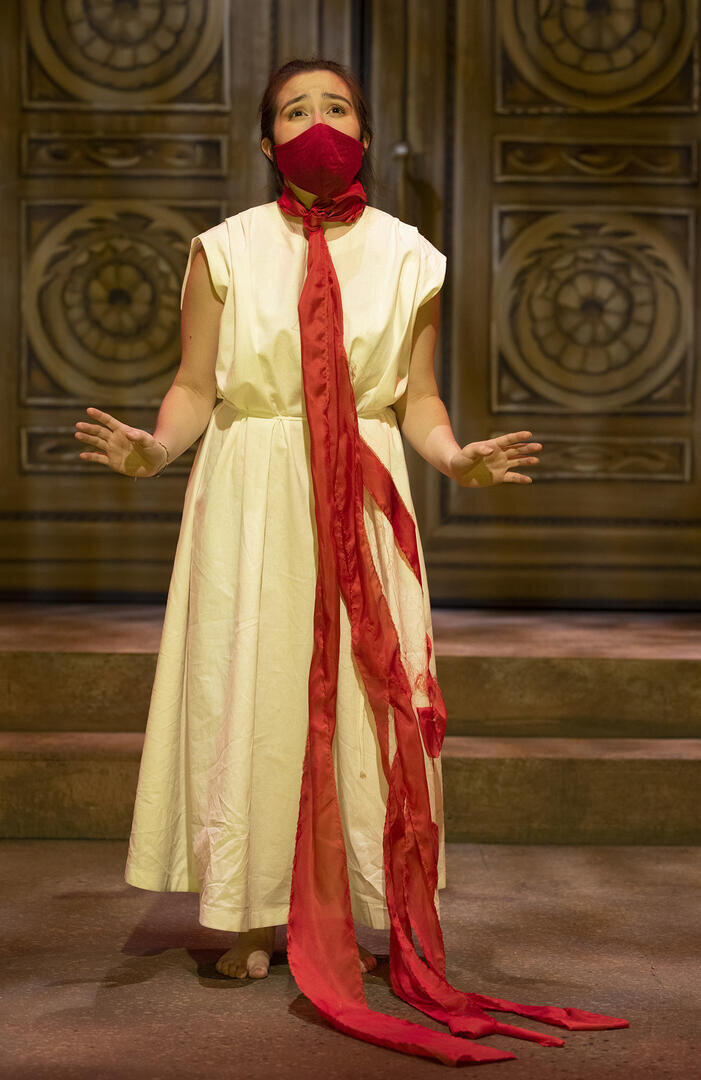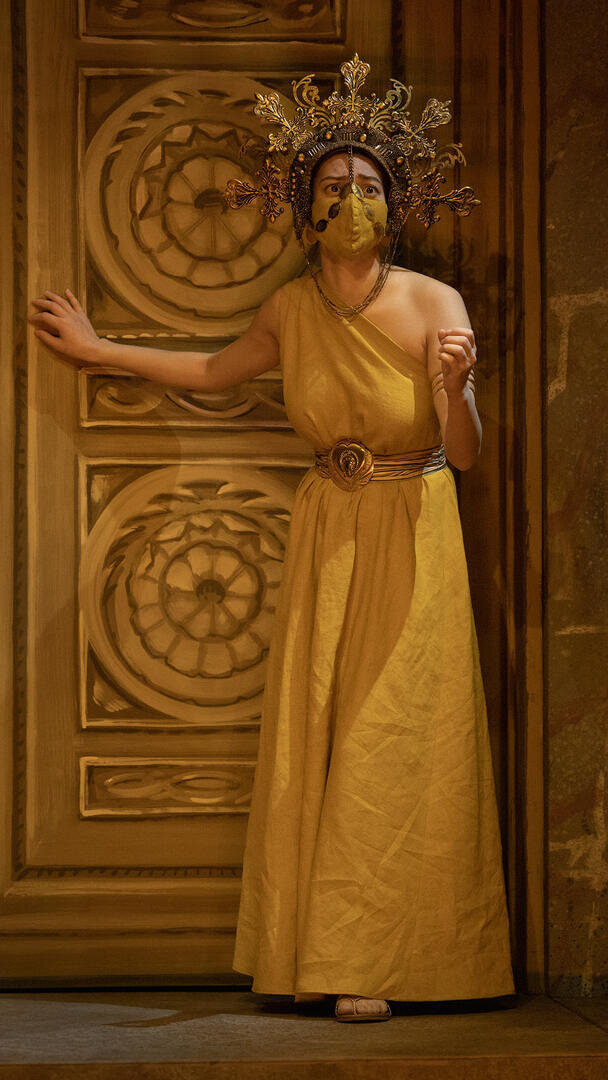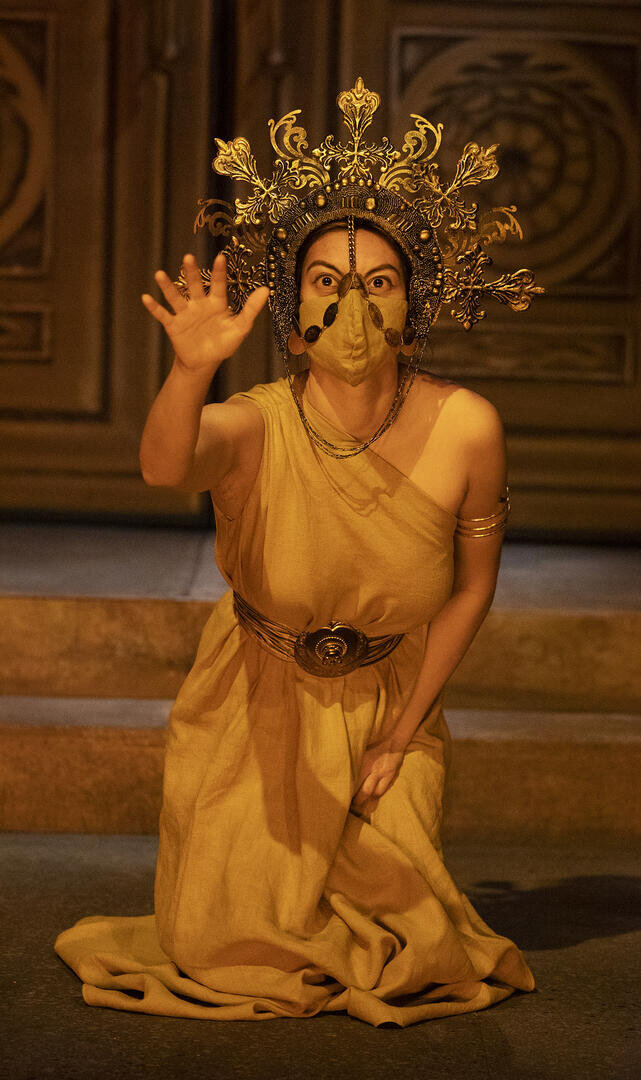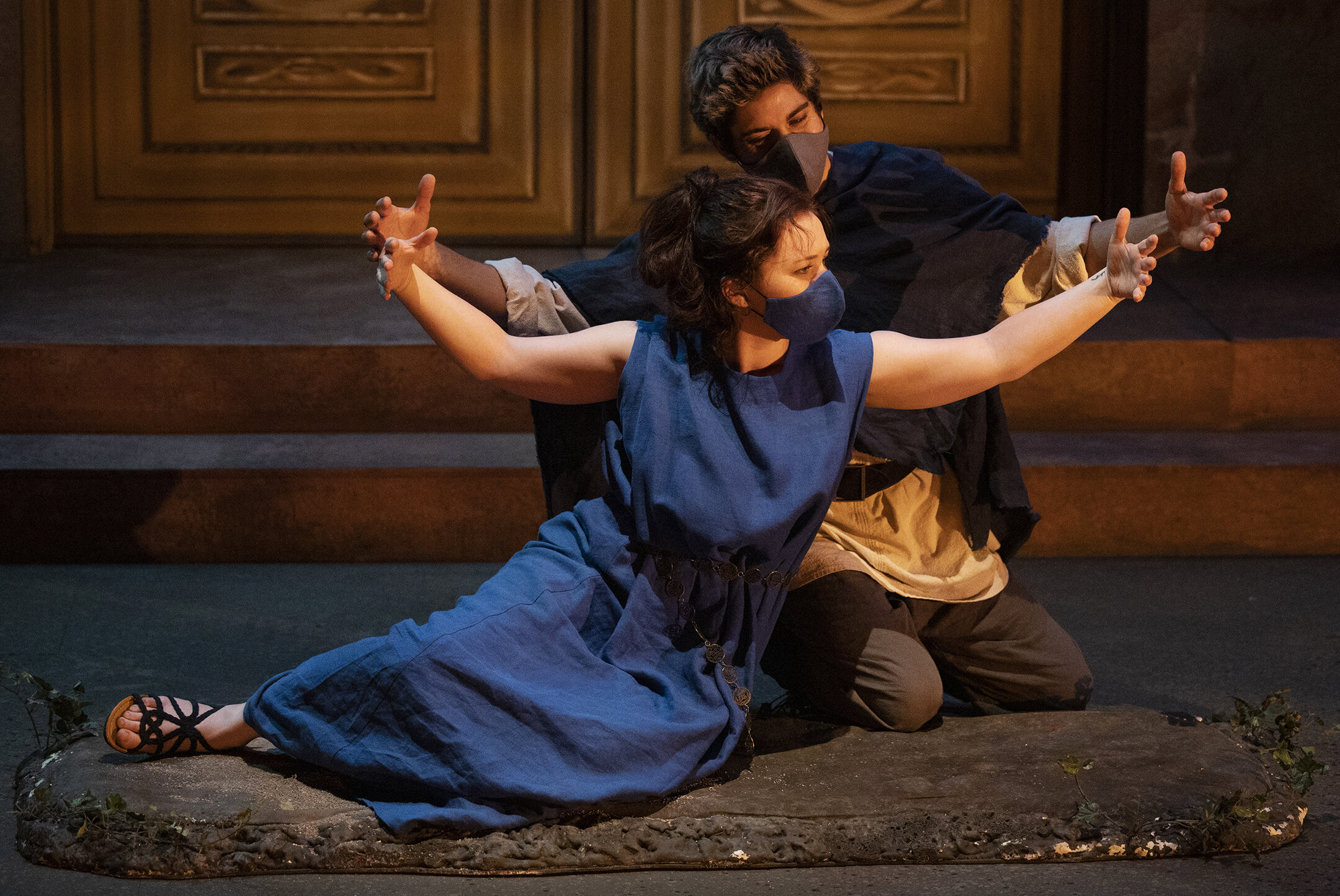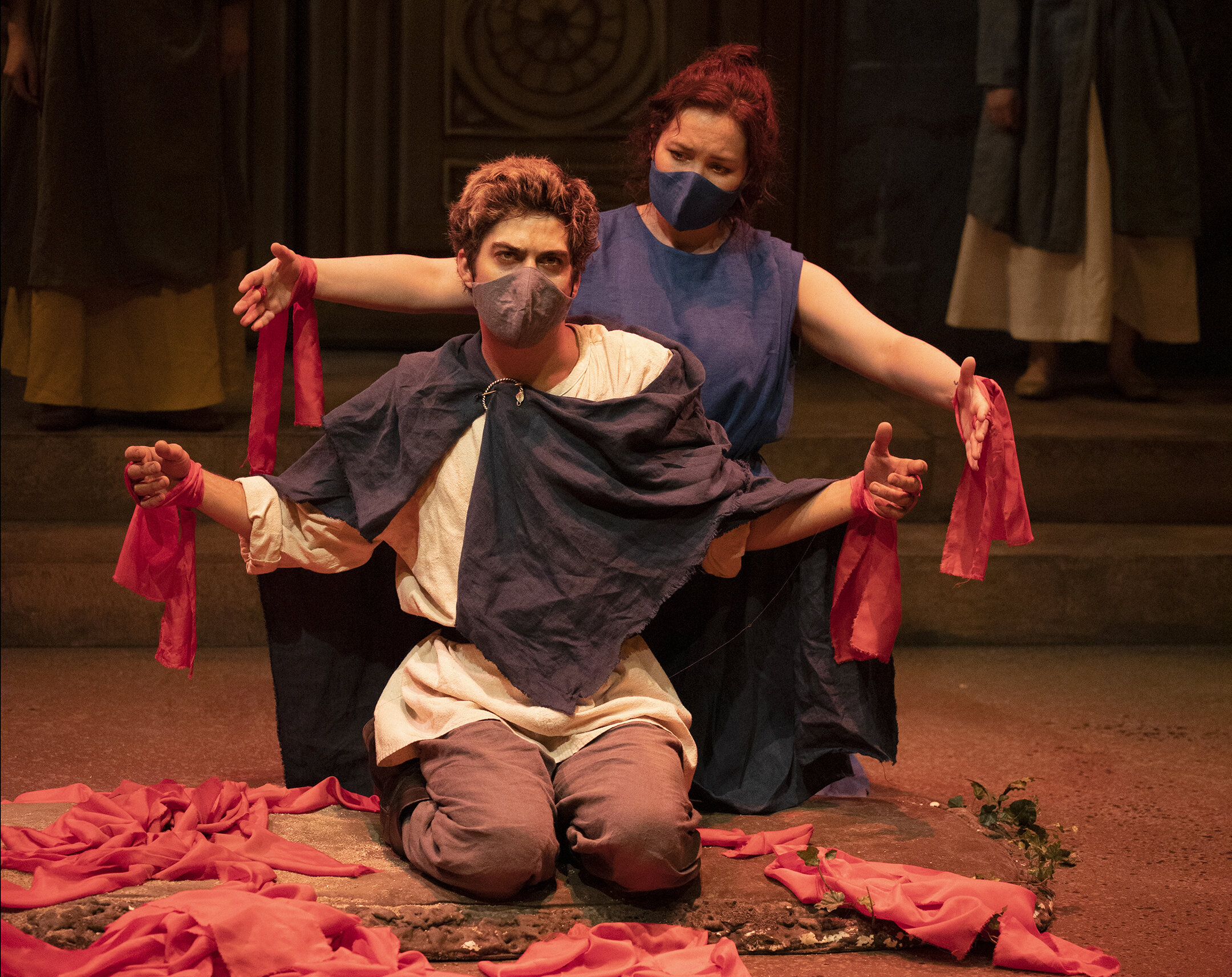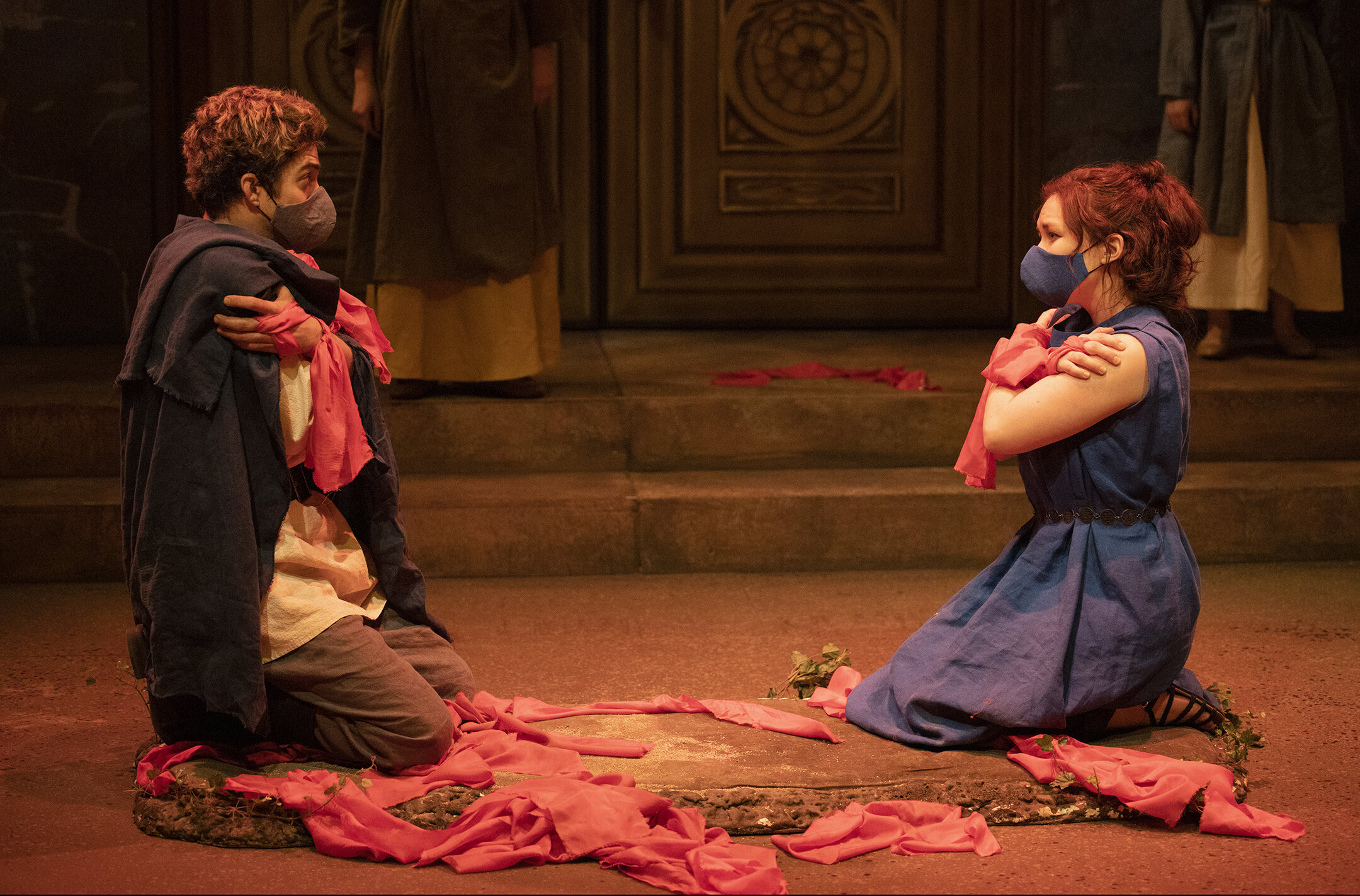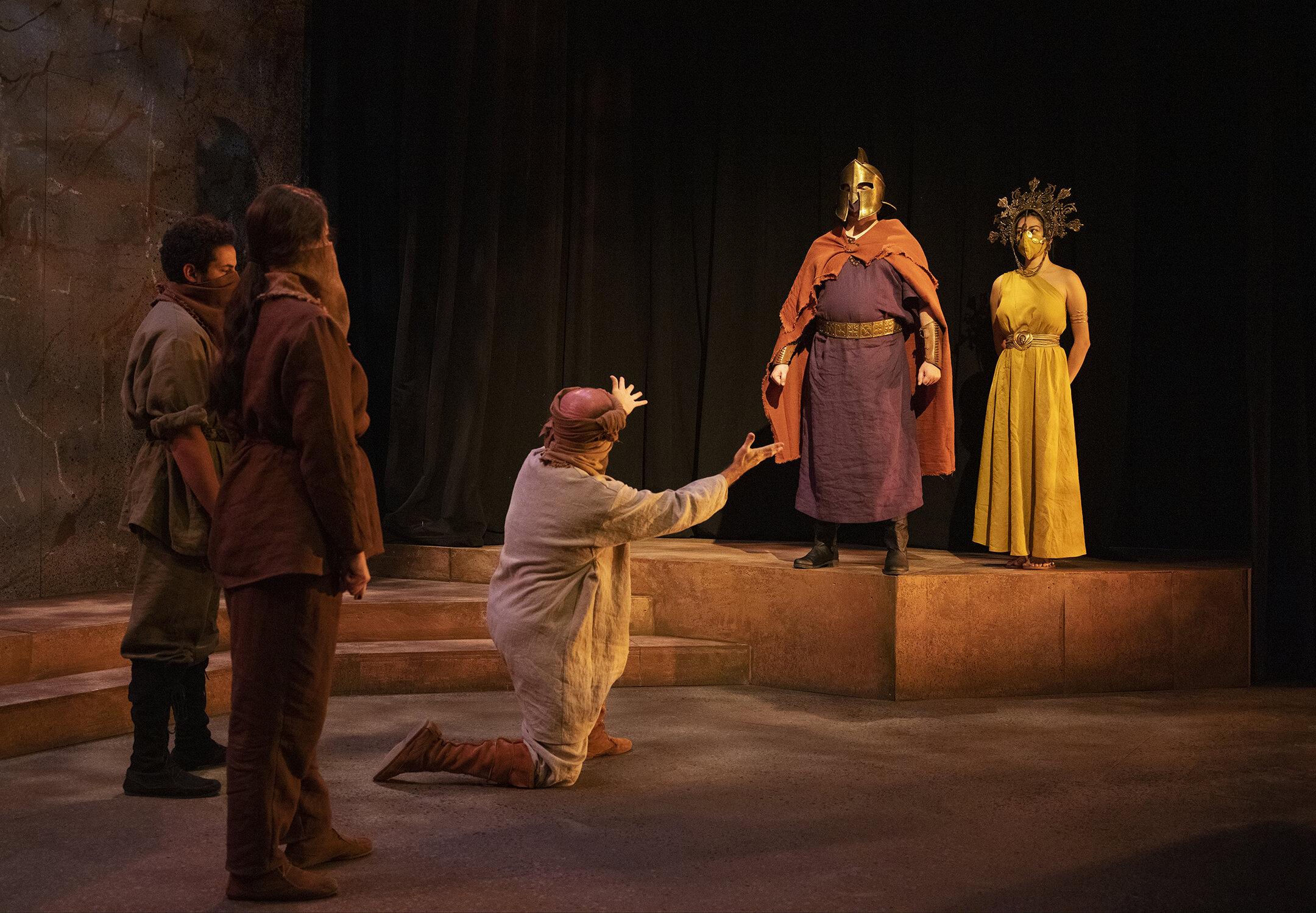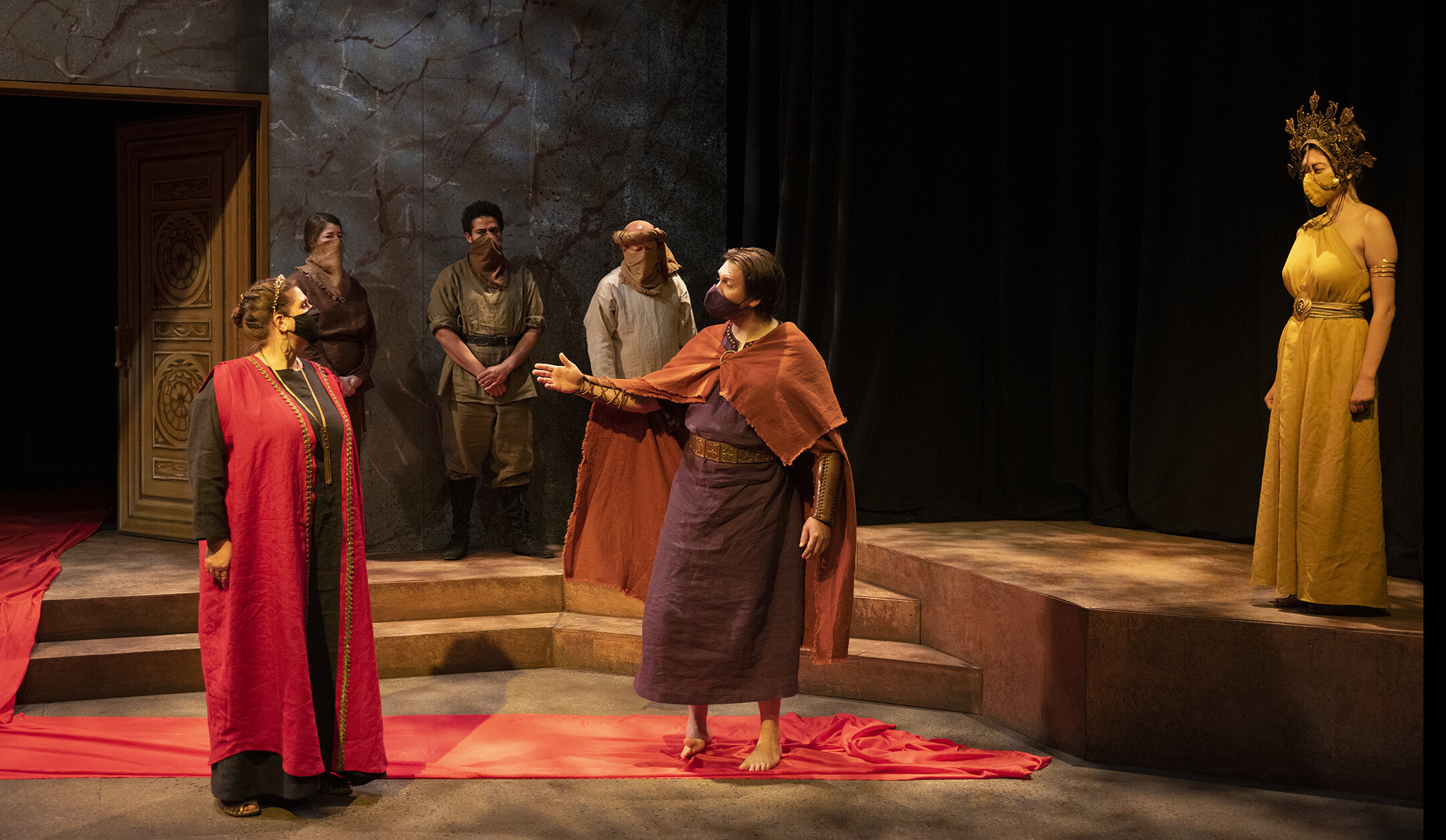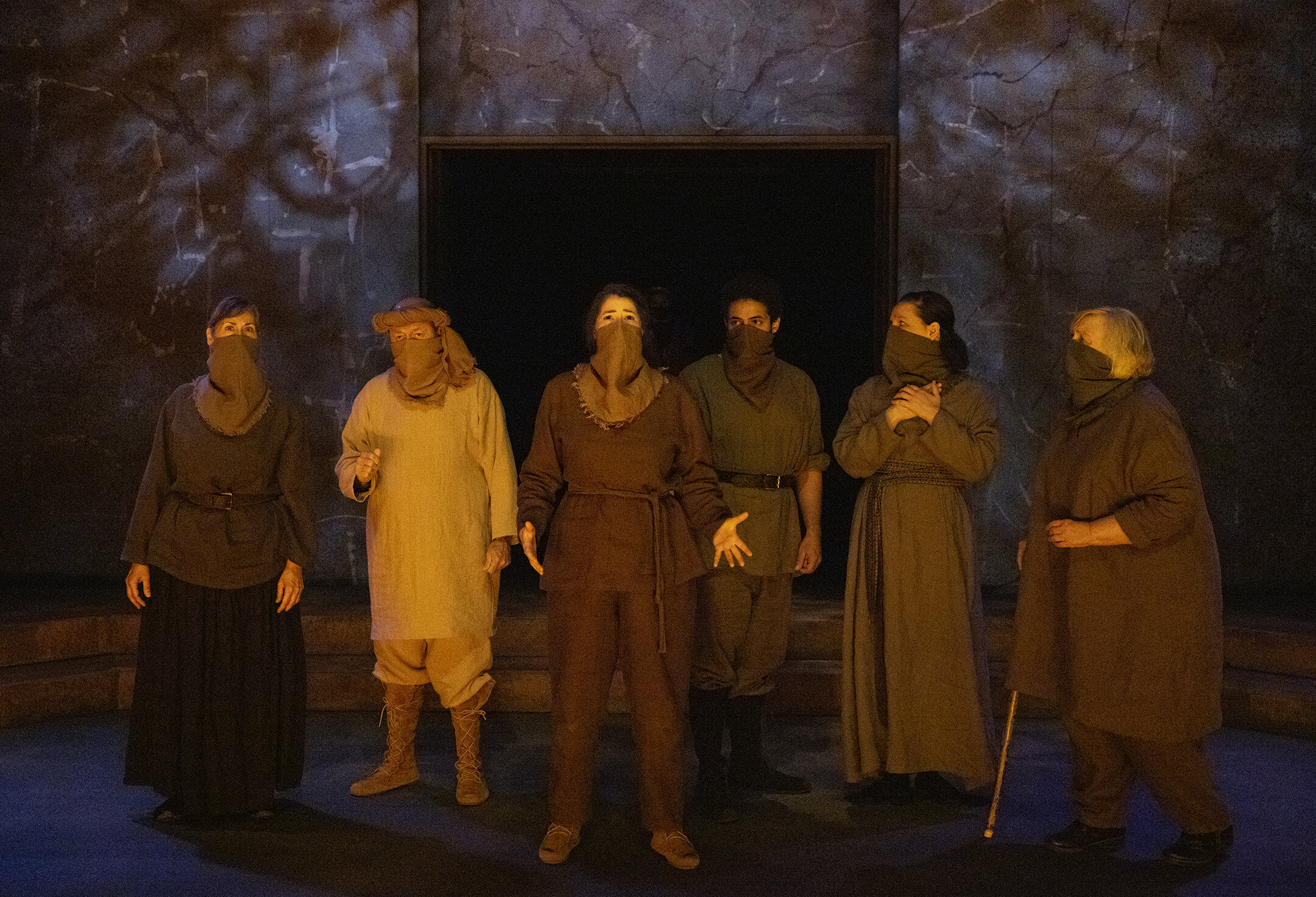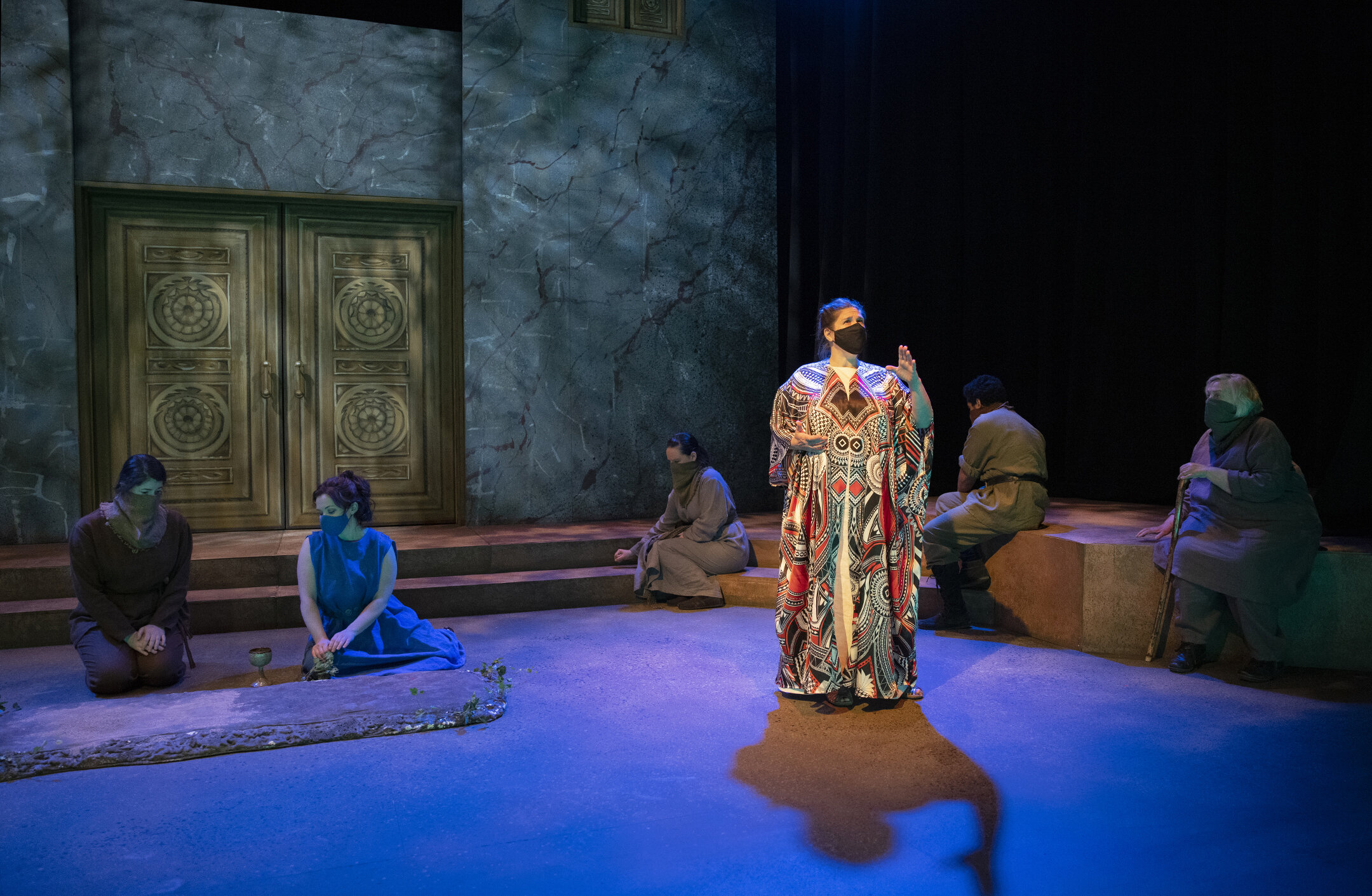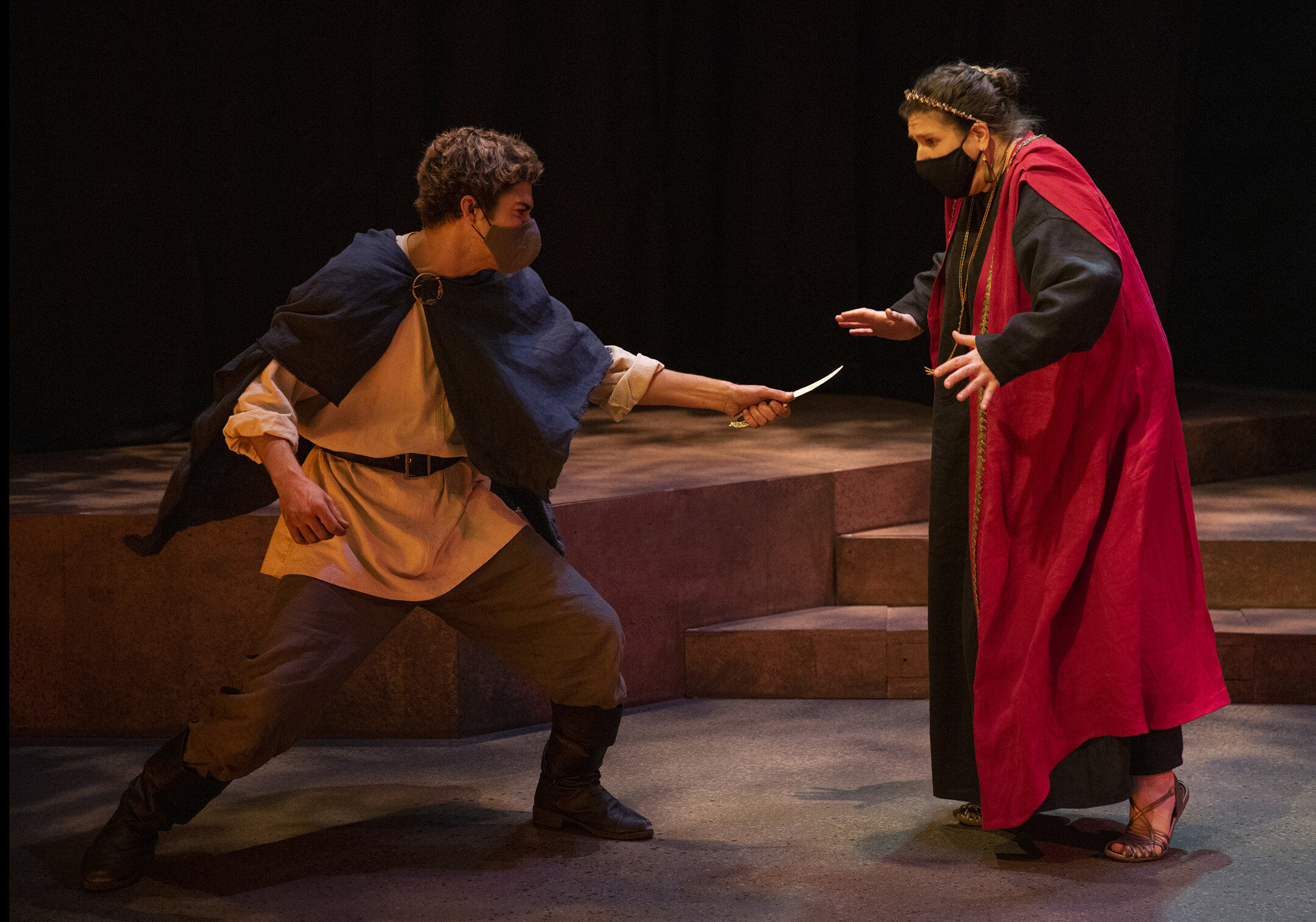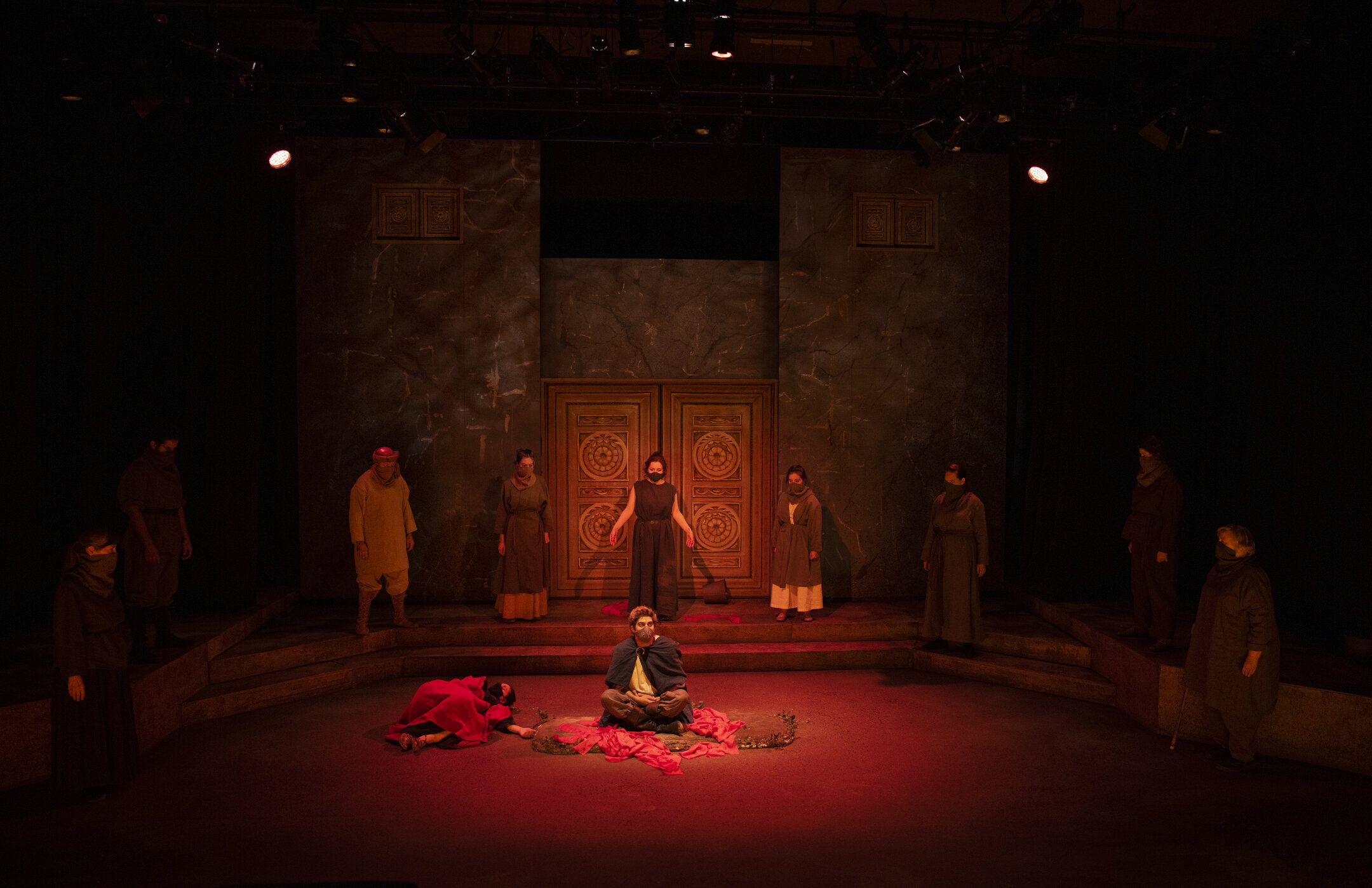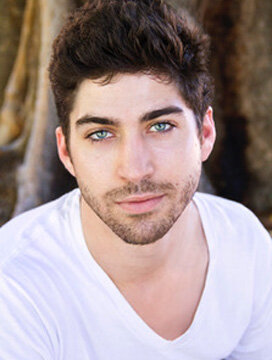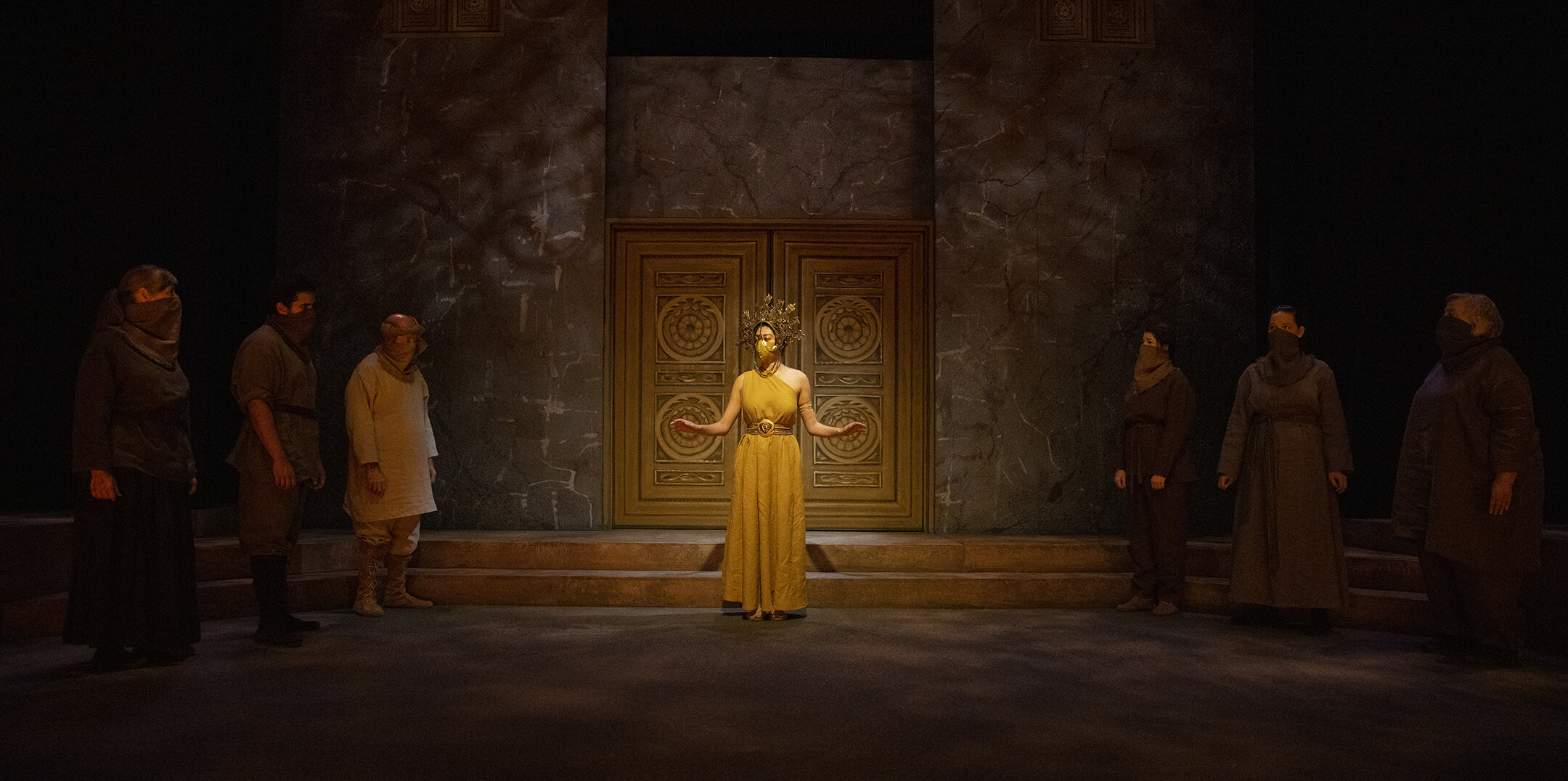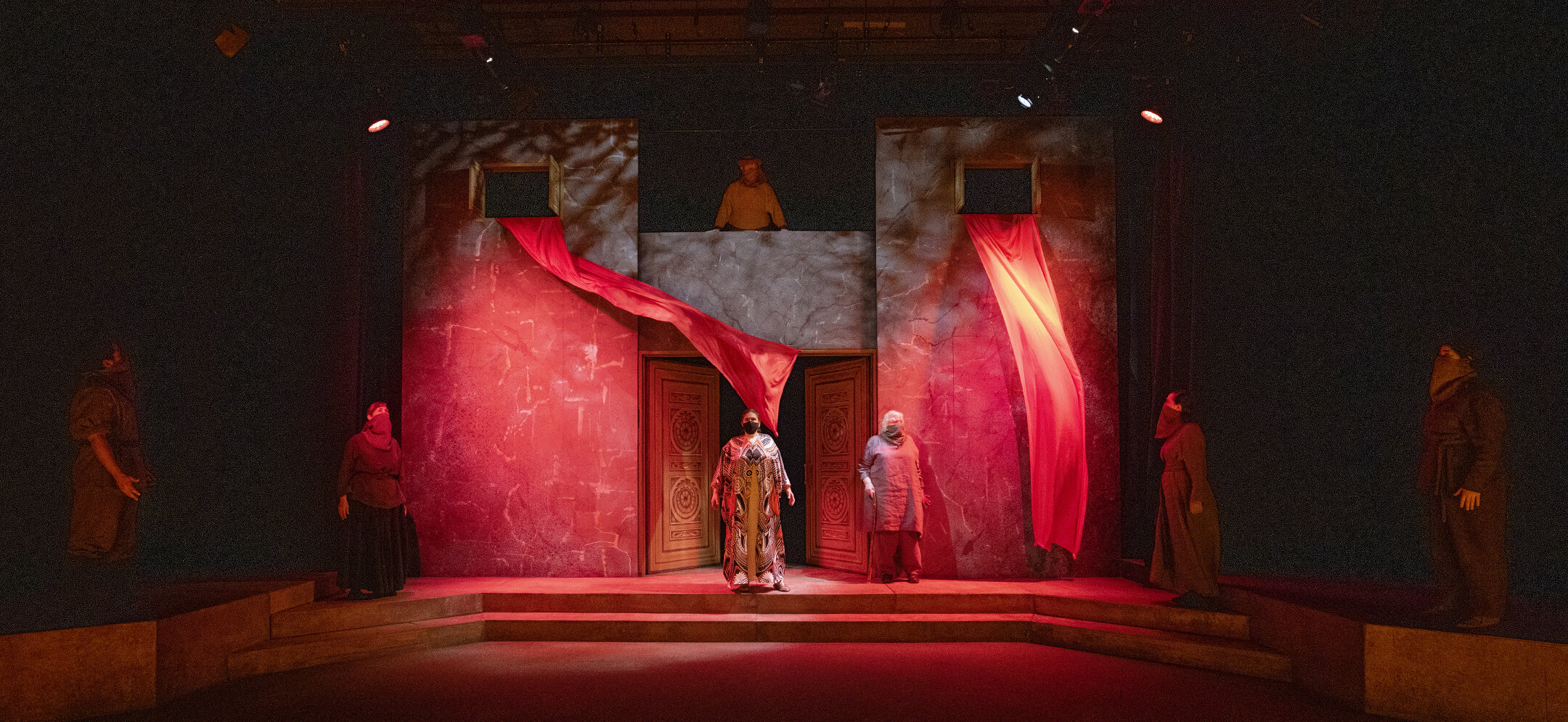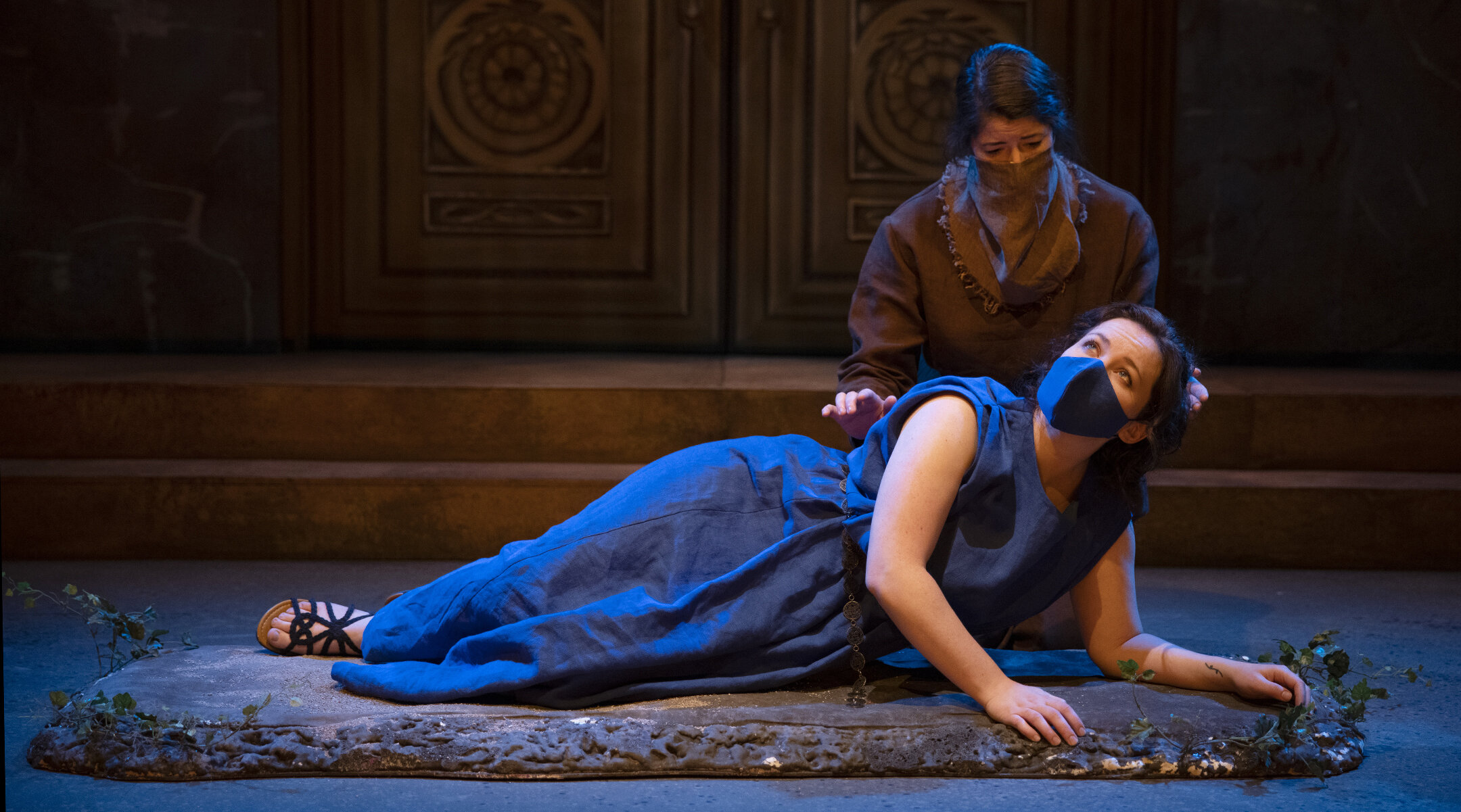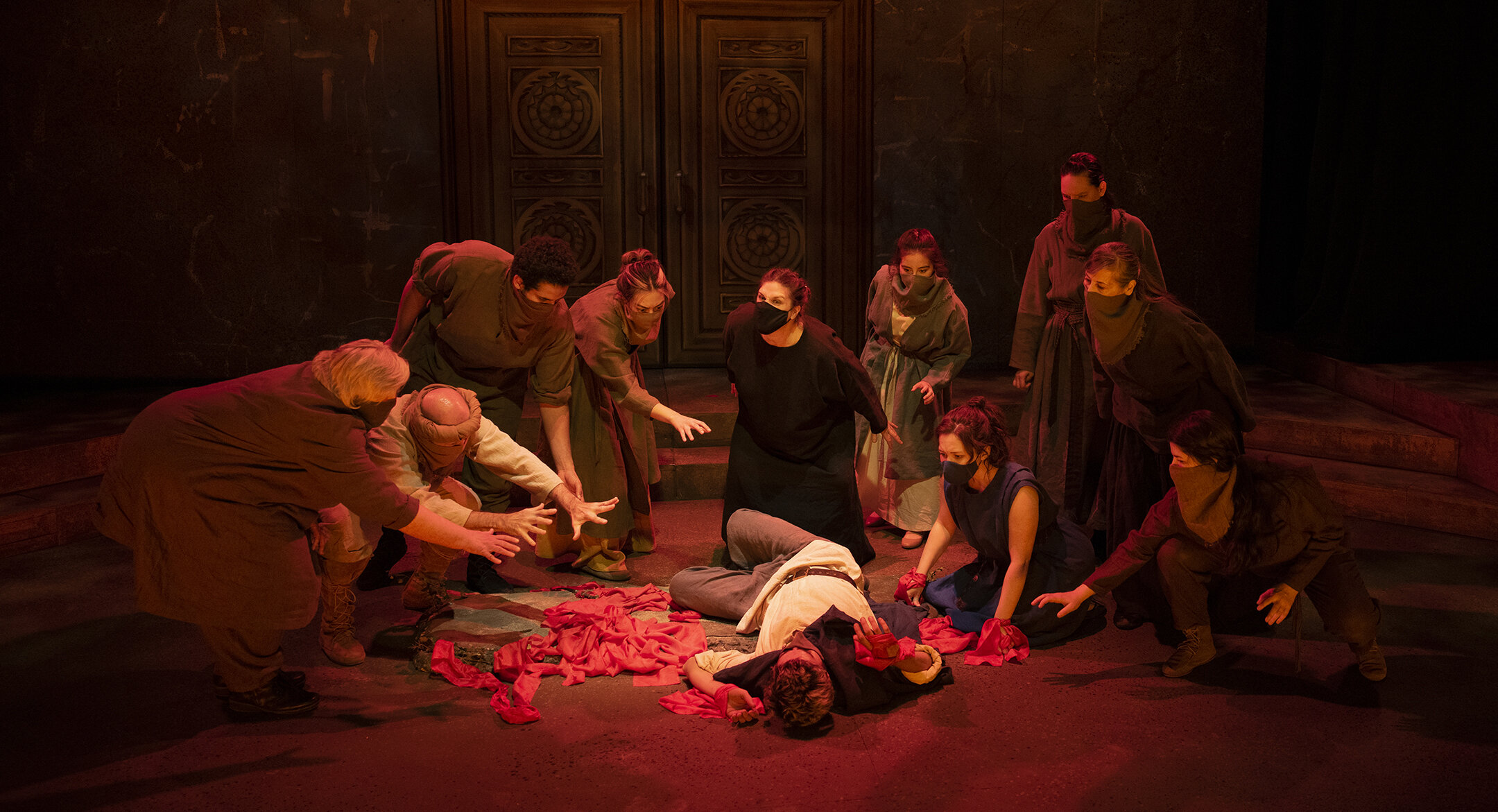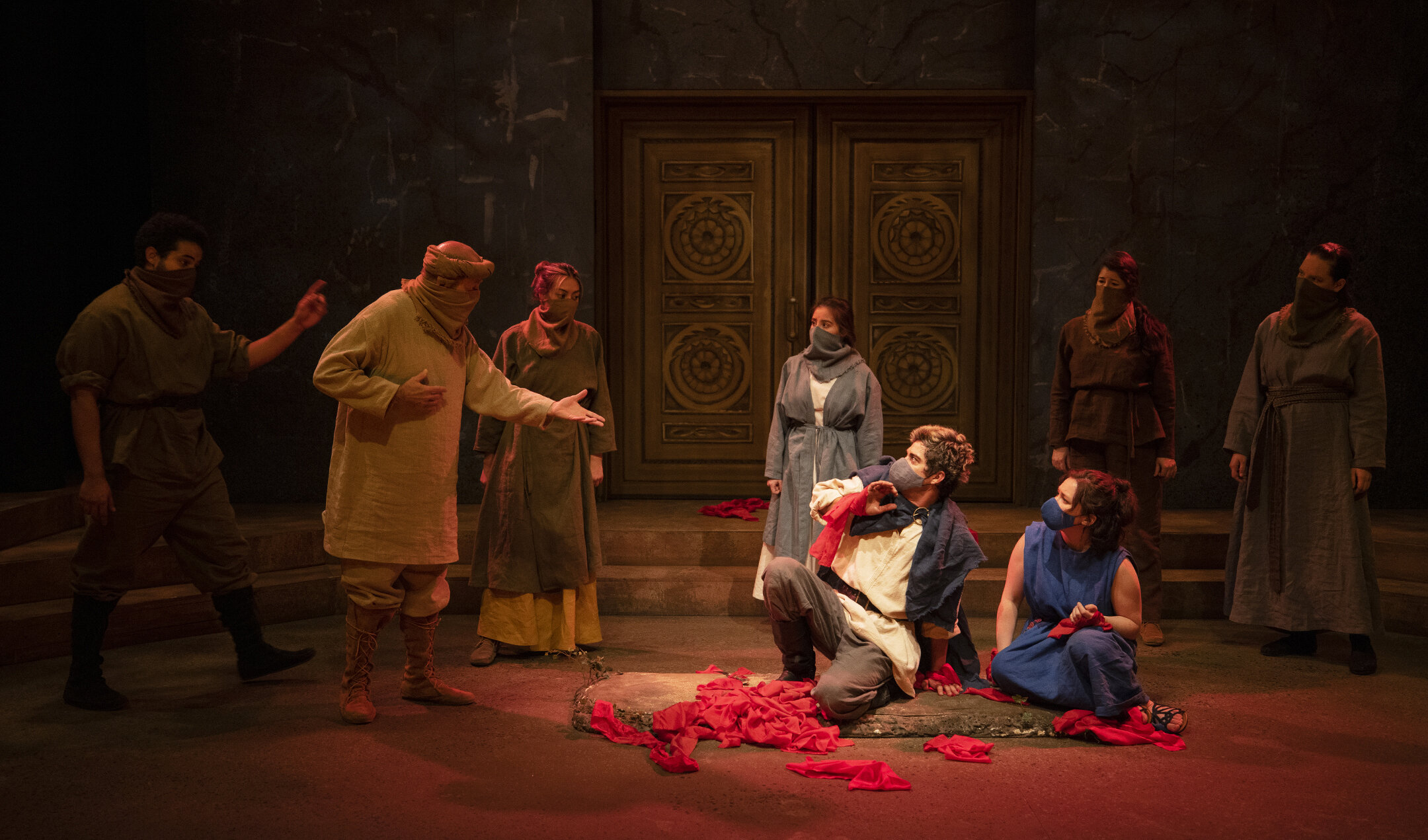Your production was a profound vision of a literary marvel which held me spellbound.
—Lillian Essex
What an amazing production! I enjoyed the show and the links to additional historical material. Thank you for being creative and continuing to bring theater to the community during the pandemic.
—Daryl Ragan
Beautifully acted and written and very moving. Bravo!
—The Yale Club of Southern Arizona
I thought Ellen McLaughin did a wonderful job of condensing the trilogy into a dramatic play. Many thanks for a great production, and for all you are all doing to sustain The Rogue through these hard times.
—Julia Annas
We watched the video of The Oresteia last week, and we thought it was fantastic! We are very appreciative of your efforts to offer home viewing of your productions, and we have enjoyed them all. The actors, as always, were amazing, and we are so impressed with their ability to “act through the mask.” The production quality was excellent, and we are looking forward to seeing The Weir next month!
—Karen & Jim Carson
The Oresteia
by Ellen McLaughlin
PRODUCTION SPONSORS:
Barbara Martinsons & Larry Boutis
Directed by Joseph McGrath
Music Direction by Russell Ronnebaum
Video available January 13–31, 2021
Through ten years of war, grief and rage, Queen Clytemnestra lies in wait for her husband Agamemnon's return, determined to avenge one child, only to doom the others. The sole surviving trilogy of Greek tragedy, The Oresteia chronicles a deluge of violence that can only be stopped when society peers into its own soul.
Production Video Trailer
View the trailer for The Oresteia at The Rogue, streaming through January 31st.
Supporting Materials
Free “Open Talk” Video on The Oresteia
Click here to see the video
UA Professor Emeritus Bella Vivante talks about Aeschylus' Oresteia:
“A Glimpse at the Ancient Greek Background to Ellen McLaughlin’s The Oresteia.”
This open talk is supported in part by a generous gift from Meg and Peter Hovell.
For more background on the play, check out Jerry James’ essay
“Why Do All These Greeks Want To Kill Each Other?
The Curse(s) on the House of Atreus”
View or download the playbill
View the full-sized poster for the play
Review
The Oresteia reminds us truth and justice are not the same thing
Review of The Oresteia by Chuck Graham on January 16 in Let The Show Begin! at TucsonStage.com
Direction
Joseph McGrath (Director) is a graduate of the Juilliard School of Drama and is the Artistic Director for The Rogue Theatre. For The Rogue, Joe authored and directed Immortal Longings, and directed Blithe Spirit, Much Ado About Nothing, The Grapes of Wrath, A House of Pomegranates, Uncle Vanya (2016 Mac Award for Best Director), The Bridge of San Luis Rey, By the Bog of Cats, The Lady in the Looking Glass, Dante’s Purgatorio, Mistake of the Goddess, Mother Courage and Her Children, As I Lay Dying, The Real Inspector Hound (2010 Mac Award for Best Director), The Decameron, Our Town, Red Noses, Endymion, The Maids (winner of the Arizona Daily Star 2007 Mac Award for Best Play), and The Balcony. Joe was most recently seen as Alfieri in A View from the Bridge, Captain Ahab in Moby Dick, James Tyrone in Long Day’s Journey Into Night, Deputy Governor Danforth in The Crucible, Ambassador in The Secret in the Wings, Voice Four/Rev. Peters in The Curious Incident of the Dog in the Night-Time, Galileo in Galileo (2018 Mac Award for Best Actor), Lear in King Lear, Macbeth in Macbeth, Fitz in Penelope, in the ensemble of The White Snake, Roy Cohn in Angels in America Part One: Millennium Approaches, Mr. Taylor in Tales of the Jazz Age, a singing peasant in Miss Julie, as Claudius in Hamlet and Rosencrantz and Guildenstern Are Dead, Lord Henry Wotton in The Picture of Dorian Gray, Shylock in The Merchant of Venice, Vladimir in Waiting for Godot, Johnnie ‘Rooster’ Byron in Jerusalem, Myron Berger in Awake and Sing, Bernard Nightingale in Arcadia, Duke Vincentio in Measure for Measure, and Richard, Duke of Gloucester in Richard III. In 2009 Joe won the Arizona Daily Star Mac Award for Best Actor for his portrayal of Tobias in A Delicate Balance. He has toured with John Houseman’s Acting Company, performed with the Utah Shakespearean Festival, and he is a frequent performer with Ballet Tucson appearing in The Hunchback of Notre Dame, Cinderella, A Midsummer Night’s Dream, Dracula and The Nutcracker. He has also performed with Arizona Theatre Company, Arizona Opera, Tucson Art Theatre, and Arizona OnStage. Joe owns, with his wife Regina Gagliano, Sonora Theatre Works, which produces theatrical scenery and draperies.
Joseph McGrath’s direction of The Oresteia is supported in part
by a generous gift from Kathleen McGrath & Jerry James.
Notes from the Director
From the beginnings of The Rogue Theatre, Cindy and I have been talking about producing a classical Greek play. We’ve read many of them over the years with an eye to including one in a season. But we’ve always been intimidated by the—well—Greek-ness of the translations. A sense of drama and choral presentation that always seemed just out of reach of our capabilities, and the expectations and aesthetic eye of a contemporary audience.
But then, on a visit to Washington, DC, in May 2019, I had the good fortune to see Ellen McLaughlin’s The Oresteia at the Shakespeare Theatre Company. I was swept up in McLaughlin’s free adaptation with its fluid use of the chorus, the contemporary language, and the smaller scenes for which she clears the stage. Whereas Aeschylus’s theatre uses the chorus to deliver grand odes in often spectacular events of dance and song, McLaughlin gives us a somewhat smaller group of nameless individuals grappling with the history, attitudes, and anxieties of the community. This chorus seems to have skin in the game as individuals and also as a group. I was also intrigued by the number of women one could use in the chorus, which fit the narrative perfectly. After all, at the top of the play these are the folks left behind when the army departed for Troy. I think McLaughlin has done an excellent job in making Aeschylus available to us, in our modes of language, presentation, and expectations.
McLaughlin has hewn fairly closely to Aeschylus in the content of the first two plays of the trilogy—her acts one and two—but she has departed significantly in the third act/play, The Eumenides. Here she diverges from Aeschylus, whose narrative was set in the realm of the gods, and keeps to the human realm, dropping the problem firmly in our lap. Perhaps she feels that, with our tradition of the separation of church and state, we’ve long ago accepted that civil problems require civil solutions, and the suggestion that Athena, Apollo, and the Erinyes have any ability to resolve these things is not quite relevant to our moment.
The style of what you see in our production is heavily shaped, of course, by the requirements of safe rehearsal and performance practices in the Covid era. We’ve been challenged by the perplexing phrase “social distancing” in a pursuit that is, top to bottom, social. Thus we have developed a language of gesture and staging to support words we’re not actually speaking with half the face masked, as well as a distanced, no-touch approach to acts of intimacy and violence. These modes of expression, though they violate our expectations at first, seem to lend themselves to the formal, religious mood of the Greek theatre.
Surprisingly, The Oresteia has very little, if anything, good to say about war, given it was written by a soldier. Aeschylus fought with the Greeks against the Persians on several occasions, including the Battle of Marathon. Yet here, glory seems elusive, even to the victor, and it seems to fit our moment well. Alas, it fits more and more as the days pass. As I write this, the President-elect will be inaugurated in twelve days but the future is becoming less and less reliable, given our bifurcated electorate. This tale of blood vengeance and intractable conflict that, in the end, depicts the beginnings of civil law and resolutions, reminds us that we’ve been here before, that the fixes aren’t easy, and that the work of finding the better angels of our natures is never-ending.
Cleaning the House of Atreus, it seems, is our job.
—Joseph McGrath, Director
director@theroguetheatre.org
Playwright
Ellen McLaughlin's plays have received numerous national and international productions. They include Days and Nights Within, A Narrow Bed, Infinity’s House, Iphigenia and Other Daughters, Tongue of a Bird, The Trojan Women, Helen, The Persians, Oedipus, Ajax in Iraq, Kissing the Floor, Septimus and Clarissa, and Penelope. Producers include: the Public Theater, The National Actors’ Theater and New York Theater Workshop in NYC, Actors’ Theater of Louisville, The Actors’ Gang L.A., Classic Stage Co., N.Y., The Intiman Theater, Almeida Theater, The Mark Taper Forum, The Oregon Shakespeare Festival, The Getty Villa, and The Guthrie Theater, among other venues. She has taught playwriting at Barnard College since 1995. Other teaching posts include Breadloaf School of English, Yale Drama School and Princeton University. Ms. McLaughlin is also an actor. She is most well known for having originated the part of the Angel in Tony Kushner’s Angels in America, appearing in every U.S. production from its earliest workshops through its Broadway run.
McLaughlin writes about her thoughts in creating The Oresteia
What do we do about the human compulsion toward violence? How do we transcend the cycles of blood that have created so much of the misery of human existence since our very beginnings?
I began writing my version of The Oresteia in 2016 in what seems another world, when the unthinkable happened with the election of the latest American president. I came to a dead stop and could see no way forward, not only in the play but in my life.
While commiserating with a friend who works in human rights, mostly in Africa, I said, “This is not the first time people have felt this way. Indeed, The Oresteia is about how a people moves on after having seen the worst human beings are capable of—what do we do once we have become morally unrecognizable? People in the past have sometimes recovered the best of human nature, even when they thought it had been lost forever.”
She mentioned the Truth and Reconciliation Commission in South Africa without which, she maintains, that country would be in a state of perpetual civil war, embroiled in a bitter past they could never escape. The principle at work is that both the perpetrators and the victims of violence have been exiled by those experiences from their community and that something must be done to reinstate them into the circle of the human. It is simply about gathering in a public space open to all. Everyone concerned, both the victims and the perpetrators of the violence, is present. Nothing is promised, but all will be heard. Everybody gets to speak their truth. And in so doing, we, all of us, recognize each other.
It’s an ancient concept, a Greek one in fact, that notion that in recognizing each other in all our confusion, pain, and jagged moments of violence and cruelty, bravery and kindness, we draw ourselves back to the circle of what we share. It’s born of the belief that only by bringing us all into the same place and hearing the truth if we can speak it, can we heal. Which is of course the basic principle at work in theater. I thought, if I can find a way to bring that essential grace to the third act of my play, I might be able to write my way to something like hope in these dark times. So that’s what I have tried to do. We don’t offer judgement at the end so much as the mystery of mercy, born of the act of listening and recognition.
Cast
| Clytemnestra | Julia Balestracci | |
| Agamemnon | Aaron Shand* | |
| Iphigenia | Sol Murguia | |
| Orestes | Hunter Hnat* | |
| Electra | Bryn Booth* | |
| Cassandra | Nicole DelPrete | |
| Chorus | Rosanne Couston, Shannon Elias, Lance Guzman, Callie Hutchison, Cynthia Meier*, Dennis O’Dell |
|
| *Member of The Rogue
Resident Acting Ensemble |
||
Julia Balestracci (Clytemnestra) is delighted to join the cast of The Oresteia in her inaugural performance with The Rogue. She has appeared in the past three seasons at The Scoundrel and Scamp Theatre next door, most recently as the witch in the musical The Light Princess. Other productions include The Little Prince, Blood Wedding, Eurydice, and Mr. Burns, a Post-Electric Play. An East Coast transplant, she has been involved in the performing arts in many capacities, from acting and puppetry, as an original member of Brooklyn theater company Drama of Works, to various forms of folk music and dance, to ensemble and solo performances singing operatic, classical, and early music repertoire. She has performed at diverse venues, including the Brooklyn Museum, Harvard University, Avery Fisher Hall, and HERE Arts Center. Julia has a M.M. in voice from Longy School of Music of Bard College, and a BA in Theater Studies from Eugene Lang College of Liberal Arts at The New School.
Julia Balestracci’s performance is supported in part by generous gifts
from Art & Katherine Jacobson and Brock & Chantal McCaman.
Bryn Booth (Electra) is a graduate of the BFA Acting program at the University of Arizona. She was most recently seen as Mary Shelley/Elizabeth in Mary Shelley’s Frankenstein and as Catherine in A View from the Bridge. This is Bryn’s fourth season as a member of the Resident Acting Ensemble with The Rogue where she has performed as Clotho (Moby Dick), Ruth Condomine (Blithe Spirit), Tour Guide (Middletown), Abigail (The Crucible) for which she was nominated for a MAC award for Best Actress, Snake-Leaves Princess (The Secret in the Wings), Hero (Much Ado About Nothing), Ensemble (The Curious Incident of the Dog in the Night-Time), Little Monk (Galileo), Regan (King Lear), Rose of Sharon (The Grapes of Wrath), Sybil (A House of Pomegranates), and Lady Macduff (Macbeth). In 2018, Bryn played Mag in the Scoundrel & Scamp’s production of Lovers, for which she was nominated for a MAC award for Best Actress. Other credits include The Love Talker (Scoundrel & Scamp) Romeo & Juliet (Tucson Shakespeare in the Park), and Othello (Arizona Repertory Theatre). She also had the pleasure of understudying with Arizona Theatre Company in Romeo & Juliet and Of Mice and Men. Bryn wants to thank Joe and Cindy for giving her the best job she’s ever had with the most amazing people she’s ever met.
Bryn Booth’s performance is supported in part by generous gifts
from Joan Warfield and Denice Blake & John Blackwell.
Rosanne Couston (Chorus) is a native Tucsonan most recently appeared in partially staged reading of A Poison Squad of Whispering Women and a full production of The Hall of Final Ruinwith Something Something Theatre. She has worked extensively with Borderlands Theater in such shows as Nogales: Storytellers in Cartel Country, Barrio Stories, Burning Patience, Electricidad, and Barrio Hollywood. Her bilingual productions include Ausente/Absence, Sazon de Mujer, Living Out, and The House of Spirits. She also performed with Winding Road Theater Ensemble, The Rogue Theatre, Invisible Theatre, Live Theatre Workshop and Mercury Productions. By day, she is an Academic Librarian who is also the voiceover talent for her college’s information literacy tutorials.
Rosanne Couston’s performance is supported in part by generous gifts from
Sarah Boroson & Rosemarie Ampela and Bill & Barb Dantzler.
Nicole DelPrete (Cassandra/Chorus) is currently a senior studying Theatre and Creative Writing at the University of Arizona. She is very thankful that this is her very first show with The Rogue Theatre. Previously, Nicole was in This Girl Laughs, This Girl Cries, This Girl Does Nothing, Blood Wedding, Little Prince, and The Light Princess at the Scoundrel and Scamp Theatre. She also is a part of the Charles Darwin Experience, an improv troupe at University of Arizona. She would like to thank her family and friends for their loving support.
Nicole DelPrete’s performance is supported in
part by a generous gift from Todd Hansen.
Shannon Elias (Chorus) is making her Rogue Theatre acting debut with The Oresteia. She can usually be seen in the box office, and is so thrilled to have been given the opportunity to make the jump to the stage. She’s performed in a number of productions in both Phoenix and Tucson. Favorite roles have included Olive Madison in The Odd Couple, Aunt Letty in The Magician’s Nephew, and The Activist in Power 2K10, a devised theatre piece with the University of Arizona’s Studio Series. More recently, she’s been seen in productions at The Scoundrel and Scamp Theatre (The Thanksgiving Show) and Strada Company (Job: A Story). Shannon holds a Bachelor of Arts in Theatre Arts from the University of Arizona with a minor in Special Education and Rehabilitation Psychology.
Shannon Elias’ performance is supported in part
by a generous gift from John & Diane Wilson.
Lance Guzman (Chorus) is happy to be joining The Rogue for The Oresteia. He was previously in Moby Dick as Fedallah. He has also appeared in the Scoundrel and Scamp productions Salome, Mr. Burns, Blood Wedding, The Little Prince and most recently in It Is Magic. He is a University of Arizona graduate with a BA in Theatre Arts and a student of the Bennett Theatre Lab.
Lance Guzman’s performance is supported in part by a
generous gift from Rhonda & Robert Fleming.
Hunter Hnat (Orestes) is grateful to be in his third season as a member of The Rogue Resident Acting Ensemble. You may have seen him in previous Rogue productions as Lord Byron/Frankenstein in Mary Shelley’s Frankenstein, Rodolpho in A View from the Bridge, Ray Dooley in The Beauty Queen of Leenane, Flask in Moby Dick, Edmund Tyrone in Long Day’s Journey Into Night, the Mechanic in Middletown, Ezekiel Cheever in The Crucible, Ensemble in The Secret in the Wings, Claudio in Much Ado About Nothing, Christopher in The Curious Incident of the Dog in the Night-Time, Andrea in Galileo, Oswald in King Lear, Steindorff in Bach at Leipzig, and Ensemble for A House of Pomegranates. Other credits include Salomé (Scoundrel & Scamp), U/S in Romeo and Juliet (Arizona Theatre Company), How the House Burned Down (Live Theatre Workshop) as well as several other workshops and readings. He is a U of A alumnus with his BFA in Musical Theatre, class of 2015. Enjoy the show!
Hunter Hnat’s performance is supported in part by generous gifts from
Tim Wernette & Carolyn Brown and Paul Winick & Ronda Lustman.
Callie Hutchison (Chorus, Violin) Originally hailing from the great state of Minnesota, Callie gladly escaped the frozen northern clutches of the Twin Cities for the searing heat of Tucson, and ever since can be found performing all over southern Arizona as an actor and musician. This includes productions at The Scoundrel and Scamp Theatre, Arizona Repertory Theatre, The Bennett Theatre Lab, the Tucson Repertory Orchestra, and as a founding member of the Engelmann Quintet, and the Sky Island Chamber Society. When she’s not acting, teaching or playing the violin, she directs the Cochise County Youth Orchestra and the Cochise College Orchestra.
Callie Hutchison’s performance is supported in
part by a generous gift from Shawn Burke.
Cynthia Meier (Chorus) is the Managing and Associate Artistic Director for The Rogue, and has appeared recently in A View from the Bridge, The Beauty Queen of Leenane, Blithe Spirit, The Crucible, Three Tall Women, and The Grapes of Wrath. Cynthia has been nominated for nine Mac Awards for Best Actress from the Arizona Daily Star and received the 2008 Mac Award for her portrayal of Stevie in The Goat. She has also performed with Arizona Repertory Theatre, Arizona Theatre Company, Michigan Repertory Theatre and Borderlands Theatre. Cynthia holds a Ph.D. in Performance Studies from the University of Arizona.
Cynthia Meier’s performance is supported in part by generous gifts from
Sally Krusing and Laura Kosakowsky and Laura & Thomas Pew.
Sol Murguia (Iphigenia/Chorus) Is very grateful for the opportunity to be in her first show at The Rogue. She performed mostly at Flowing Wells High School in Frankenstein; Cuando Soñamos; Cuando Mentimos; Newsies, and many more. Sol is a student at the University of Arizona studying Veterinary Science while minoring in Theater performance. She hopes to continue performing at The Rogue and gives thanks to all who support her journey as an upcoming local actress.
Sol Murguia’s performance is supported in part
by a generous gift from Matt McGrath.
Dennis O'Dell (Watchman/Chorus) Dennis is thrilled to be returning to his first love, theatre, after a 26-year hiatus in the world of Retail Business Management. Dennis and his wife founded and operated an Off-Loop Professional/Educational theatre company, The Center Ring, in Chicago in the 1980s and 1990s, with an emphasis on training young actors and showcasing them in production with working professionals. As an actor, favorite roles include Shaw in Dear Liar, Tevya in Fiddler on the Roof, Glas in Slow Dance on the Killing Ground, and anything and everything Shakespeare.
Dennis O’Dell’s performance is supported in part by generous gifts from
Lori Levine & Gary Benna and Tim Wernette & Carolyn Brown.
Aaron Shand (Agamemnon) was last seen on The Rogue stage as Eddie Carbone in A View from the Bridge. Now in his third season as a member of The Rogue Theatre’s Resident Acting Ensemble, Aaron has also appeared as Ishmael in Moby Dick, The Cop in Middletown, Hathorne in The Crucible, The Sea Captain in The Secret in the Wings, Don Pedro in Much Ado About Nothing, Sagredo in Galileo, Noah Joad in The Grapes of Wrath and Duke of Albany in King Lear. Born and raised in Tucson, he received his B.F.A. in Acting from the University of Arizona, performing for the Arizona Repertory Theatre in Bus Stop, The Miracle Workerand Romeo & Juliet. He also spent a season with the Milwaukee Repertory Theater, performing in The Cherry Orchard, State of the Union and A Christmas Carol.
Aaron Shand’s performance is supported in part by generous gifts
from Carol Mangold and Andy & Cammie Watson.
Music
Russell Ronnebaum, Music Director and Composer
Piano and Percussion — Russell Ronnebaum
Violin —Callie Hutchison
Taiko—Karen Falkenstrom of Odaiko Sonora
Music Recorded by Jim Brady Studios
Production Music
by Russell Ronnebaum
Melodic themes:
Opening Theme: Orestes Chorus (Euripides)
The Ceremony
I Might Have Been Spared This
Snake Dream
They Are Coming For You
Underscoring:
Taiko drum, singing bowls, cymbals, gongs,
wind chimes, prepared piano, violin
Russell Ronnebaum (Music Director, Composer/Arranger) serves as The Rogue Theatre’s Director of Music and Resident Composer. He holds a Master of Music degree in collaborative piano from the University of Arizona where he studied under Dr. Paula Fan. He currently serves as the assistant director of music at St. Mark the Evangelist Catholic Church in Oro Valley, as well as the staff accompanist for the Tucson Masterworks Chorale. As a classically trained pianist, Russell has performed with the Tucson Symphony Orchestra, the American Wind Symphony Orchestra, Artifact Dance Company, Arizona Repertory Theatre, and as a concerto soloist with the Tucson Masterworks Chorale. Russell made his Carnegie Hall debut in 2016 performing the music of composer Dan Forrest. Past credits include The Rogue’s 2019 and 2020 productions of Much Ado About Nothing, Long Day’s Journey Into Night, Blithe Spirit, Moby Dick, The Beauty Queen of Leenane, The Awakening, A View from the Bridge and Mary Shelley’s Frankenstein (Music Director, Pianist, and Composer) and The Secret in the Wings (Vocal Director). Russell also composes the music for Rogue Radio, a radio play series produced in partnership with Arizona Public Media, NPR 89.1 FM. Recent composition commissions and premieres include music for bassoon quartet, live theatre, strings, brass, voice, choir, and piano. Recordings, videos, sheet music, and upcoming concert dates can be found at www.RRonnebaum.com.
Russell Ronnebaum’s music direction is supported in part by a
generous gift from Peggy Houghton & Paul Garnern.
Karen Falkenstrom (Taiko) began playing taiko in Tucson in 2001, and co-founded Odaiko Sonora in 2002. She has worked for, directed and helped found several music and literary arts nonprofits, such as Kore Press, Tucson Poetry Festival, InConcert! Tucson, the UA Poetry Center and Tucson Pima Arts Council. The daughter of a violinist and opera singer, Karen’s life has been filled with the notes and rhythms of life. It’s always an amazing honor to share those with her favorite Rogues.
Music Director’s Notes
The Oresteia is the oldest known Greek trilogy in existence, and it exists because of the Greek’s steadfast tradition of writing down their thoughts and ideas. Luckily, they continued this tradition of record keeping with the music they wrote.
The opening theme is penned by Euripides and was written for a production of Aeschylus’ The Oresteia in 408 BCE. This piece was discovered in 1892 and reconstructed by scholars of ancient music only a few years ago in 2016. It is one of about 60 pieces of music discovered and preserved from the ancient times.
The exact tuning system of the Ancient Greeks is difficult to decipher, but it is known that they used octave-based scales like we do today (think Do, Re, Mi, Fa, So, La, Ti, Do). The intervals of the octave, 5th, and 4th have a sonically pleasant purity, and it is Pythagoras (c. 530 BCE) who discovered a mathematical ratio between these intervals and their harmonic series. Pythagoras did not invent musical scales, but he did help to explain why the human ear is drawn to the use of said intervals. This “purity” serves as the foundation of Western music tuning as we know it today.
Unlike, the 4th and 5th scale degrees, the intervals of the 2nd and 3rd do not have mathematically pure ratios. Therefore, the tuning is subjective and is interpreted differently depending on where one is geographically. It wasn’t until J.S. Bach’s time in the early 18th century that the Western world began to adopt the system of equal temperament.
The opening theme is believed to be in the Doric mode (a precursor to the Western Dorianmode), in which the 2nd and 3rd scale degrees are comprised of three different microtones. This kind of tuning is unfamiliar to the modern Western ear, but I’ve attempted to capture some of the ‘authentic’ tuning of the time. Most of the melodic themes in this production gravitate towards this ancient tuning ideal.
—Russell Ronnebaum, Music Director, pianist and composer
Designers and Production Staff
| Costume Design | Cynthia Meier | |
| Costume design is supported in part
by a generous gift from Jan Linn & Richard Pincus |
||
| Scenic Design | Joseph McGrath | |
| Scenic design is supported in part by
a generous gift from Shawn Burke |
||
| Lighting Design | Don Fox | |
| Lighting design is supported in part
by a generous gift from Paul Winick & Ronda Lustman |
||
| Sound Design & Audio Post-Production |
Vincent Calianno | |
| Stage Manager | Shannon Wallace | |
| Scenic Artist | Amy Novelli | |
| Property Master | Christopher Pankratz | |
| Production Recording | Chris Babbie of Location Sound | |
| Audio Producer | Christopher Johnson | |
| Videographer | Tim O’Grady | |
| Assistant Stage Manager | Christopher Johnson | |
| Set Construction | Christopher Johnson & Joseph McGrath |
|
| Costume Construction | Cynthia Meier and Nanalee Raphael |
|
| Master Electrician | Peter Bleasby | |
| Asst. Lighting Design/ Lighting Intern |
Mack Woods | |
| Lighting Crew | Chris Mason & Tom Martin | |
| Box Office Manager | Thomas Wentzel | |
| Box Office Assistants | Hunter Hnat | |
| Program | Thomas Wentzel | |
| Rogue Website | Bryan Rafael Falcón, Bill Sandel & Thomas Wentzel |
|
Don Fox (Lighting Design) holds an MFA in Lighting Design from The University of Arizona and a BA in Theatre Administration from St. Edward’s University, Austin, TX. He is currently serving as an Assistant Professor for the University of Arizona. As a professional, freelance lighting and scenic designer and theatre producer and consultant, his clients include The Moscow Ballet, The Atlantis Resort Bahamas, Borgata Casino Atlantic City, Silversea Cruises, Music Theatre Wichita, Florida State University, Central Washington University, City Opera Ballet Company Bellevue, the San Antonio Botanical Garden’s Shakespeare in the Park, and many others. Locally, he has designed acclaimed Rogue productions since 2013 including Arcadia, Lady in the Looking Glass, Angels In America, By The Bog of Cats, The White Snake, A House of Pomegranates, The Grapes of Wrath, Moby Dick and A View from the Bridge, among many others. Please visit Don on the web at www.DonFoxDesigns.com.
Vincent Calianno (Sound Design & Audio Post-Production) Inspired by the renegade eloquence of the American vernacular, composer and sound designer Vincent Calianno (b. 1979) “blurs the boundaries between fine art and popular culture” (VICE), through kaleidoscopic colorings, muscular rhythms, extreme stasis and motion, while curiously investigating new musical possibilities through new practices and obsolescent technologies. Calianno’s music has been commissioned and performed by ensembles including the International Contemporary Ensemble, Alarm Will Sound, Thalea String Quartet, JACK Quartet, Nouveau Classical Project, Ensemble Mise-en, Jennifer Koh, John Pickford Richards, Kivie Cahn-Lipman, the Buffalo Philharmonic, Artifact Dance Project, and others. In addition to his concert works, Calianno has an active career in sound design and scoring for film and new media. His credits include music for Adecco, Morgan Stanley, and AlixPartners campaigns, as well as films and dramatic podcasts. His awards include the ASCAP Rudolf Nissim Prize, the Chamber Music America Classical Commissioning Award, and the Sarah Award for Best New Podcast. New projects include a new work, Ashliner, for violinist Jennifer Koh, Animal within Animal for the American Composers Orchestra and L’Astronome, a large-scale opera as part of Two Trains’ 2020/21 season. Recent highlights include the Thalea String Quartet premiere of A History of the String Quartet in its Natural Habitat, and A Painted Devil, for dance the Artifact Dance Project. In 2019, Calianno co-founded Two Trains, a hybrid music-theatre-dance project focused on abstract and inventive storytelling through the combined expressions of imagery and sound. Their first project, L’Astronome, is a nine-part opera that combines movement, text, and sound through the medium of cinema, and is set to premiere in Fall of 2020. For more information visit droplid.com.
Shannon Wallace (Stage Manager) is excited for her fourth year as Resident Stage Manager with The Rogue Theatre, after a one-year hiatus. She served as stage manager for Angels in America, A House of Pomegranates and The Grapes of Wrath. She also worked on The Picture of Dorian Gray, The Bridge of San Luis Rey, Uncle Vanya, Penelope, Macbeth, Celia, A Slave, Bach at Leipzig, Three Tall Women, King Lear, Galileo, The Curious Incident of the Dog in the Night-Time, Much Ado About Nothing, The Crucible, A View from the Bridge and Mary Shelley’s Frankenstein as stage manager as well as associate lighting designer. She graduated from the University of Arizona with a Bachelor of Fine Arts, focusing on both stage management and lighting design. During her time in school she worked on over 25 productions with Arizona Repertory Theatre. She has also worked for Arizona Theatre Company, the Oklahoma City Philharmonic, and the Contemporary American Theatre Festival serving on both stage management teams and company & events management teams. She is grateful to be working full-time as a theater artist in her hometown.
Shannon Wallace’s stage management is supported
in part by a generous gift from Clay Shirk.
Amy Novelli (Scenic Artist) is originally from Ohio and Pennsylvania. She received her Cum Laude BFA from the Columbus (Ohio) College of Art & Design in 1987 and her MFA from Carnegie Mellon University in Pittsburgh in 1994. Novelli’s scenic art career began in New York City at the Macy’s Thanksgiving Day Parade Studio. Charge Scenic Artist for the Arizona Theatre Company 2010–2014, Amy also painted several sets for Arizona Opera and UA Opera, and presently paints for The Rogue Theatre and until COVID at the Arizona Broadway Theatre in Peoria (Phoenix). Amy created monstrous Halloween decor for Hotel Congress for 20 years, and was lead painter for Marshal-Fields 1998 award winning Easter Window display “Alice in Wonderland”. She supervised four public art projects in the Tucson area with high school youth and won commissions to design and paint five large scale outdoor murals across the country as well as at the Biosphere II and La Posada Hotel on Oracle Blvd. She has taught at the University of Arizona and Pima Community College. Novelli’s fine art work has been exhibited at several Tucson Galleries and in May-August 2020 she had a one woman show at the Tucson International Airport. Amy Novelli has been living in Tucson since 1996. When not painting, Novelli trains rescue horses and dogs and enjoys riding wilderness trails all over the western states.
Amy Novelli’s scenic painting is supported in part by a
generous gift from Paul Winick & Ronda Lustman.
Nanalee Raphael (Costume Manager) has known from age five that she would work in theatre. Of course, she thought it would be as an actor, not as someone who flings fabric around. She feels blessed that she has always been employed in costuming, for both professional and academic theatres, and has never had to have a “day job.” Until moving to Tucson in 1995, she was peripatetic in her work situations, desiring to work with theatres all over the country. She has taught at the University of Wisconsin–Milwaukee but was lured by the bright lights of Chicago and so moved there to teach at the University of Illinois-Chicago. Following her husband to central Illinois, she then wangled a position at the University of Illinois, Urbana-Champaign, where she created a successful costume rental program. She then gave up all that greenery to come to Tucson to teach and design at the University of Arizona. She has worked as a costume designer, costume director and/or draper in professional theatres in Michigan, (Hope Summer Repertory, Holland), Wisconsin (American Players Theatre, Spring Green), Illinois (Goodman, Wisdom Bridge, and Steppenwolf, Chicago), New York (The Public, NYC), Arizona (ART & ATC, Tucson), at Shakespeare Festivals in Vermont and New Jersey, and California (The Old Globe, San Diego). She received both her Bachelor's and Master's degrees in Costume Design and Technology from Syracuse University. She is one of the “Pioneering Seven,” the first group of women to study full-time at Dartmouth College.
Peter Bleasby (Master Electrician) lit his first show at 13. Professionally, he was with BBC Television for several years, and was an assistant to the UK lighting designer Richard Pilbrow during the inaugural production of the National Theatre (Hamlet, directed by Olivier.) Although his career was in architectural lighting, he maintained some theatre lighting involvement on both sides of the Atlantic. In 2009, he volunteered for the Rogue’s initial season at the Historic Y. He has been master electrician at the Rogue for every show from 2013 to the present, supporting our lighting designers Deanna Fitzgerald, Don Fox, and Josh Hemmo. He devised the system that enables lights to be quickly re-arranged, allowing more time for the creative process. Elsewhere in Tucson, he directed the technical and logistical aspects of fundraisers for the Southern Arizona AIDS Foundation, including the fashion show Moda Provocateur.
Thomas Wentzel (Box Office Manager, Program, Website) is a Scientific Programmer for the National Solar Observatory and holds a Ph.D. in Physics from the University of Arizona. Previously he has worked as a Data Manager for several prevention programs in the Arizona Cancer Center and the Mel and Enid Zuckerman Arizona College of Public Health. He has served on the Board of the Tucson Men’s Cooperative, editing its newsletter for five years, and on the Executive Committee of Sons of Orpheus—The Male Choir of Tucson. He has sung with Furry Day Singers, Sons of Orpheus, AwenRising and Arizona Repertory Singers, and has performed with Tucson Art Theatre in Viktor Slavkin’s Cerceau and Clifford Odets’ Waiting for Lefty. Thomas has designed and built The Rogue Theatre Web site (with great assistance from Bill Sandel and Bryan Falcón in creating the 2020 Website update), creates all The Rogue’s posters and programs and has served as Webmaster, Business Manager and Treasurer.
Our Thanks
| Tim Fuller | Arizona Daily Star |
| Chuck Graham | Kathleen Kennedy |
| Taming of the Review | Shawn Burke |
| Jerry James | Dr. Bella Vivante |
| La Posada | |
|
Video recording of The
Oresteia is sponsored in part by a
generous donation from John &
Joyce Ambruster
|
|
| Student tickets are sponsored in
part by generous donations from |
|
| Judith Treistman |
|
| Carol Mangold | |
| and | |
| Jean & Jordan Nerenberg |
|
Performance Schedule
Performance run time of The Oresteia is one hour and fifty-five minutes. There is one intermission.
The video viewing option will be available from Wednesday, January 13
until the end of Sunday, January 31.
All live performances have been cancelled due to COVID-19.
